| Srl | Item |
| 1 |
ID:
086994
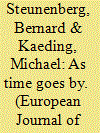

|
|
|
|
|
| Publication |
2009.
|
| Summary/Abstract |
The aim of this article is to explain the speed with which Member States transpose EC directives in the maritime sector. By discussing earlier work, the focus is on explanatory factors related to the contents of the directive that needs to be transposed and the context within which national transposition takes place. The authors' expectations have been tested using data across seven Member States and 32 maritime directives. Using survival analysis based on Cox regression, several political-administrative and legal factors are identified that have an impact on the speed of transposition. The political sensitivity of the directive and the total number of national implementing measures lengthens the duration of transposition, while the degree of specialisation of the directive, the use of package law and experience speed up transposition. The authors also find that the impact of some of these explanatory factors changes over time. This underscores the importance of taking time seriously and to explore time dependency in further theoretical work on explaining policy-making processes.
|
|
|
|
|
|
|
|
|
|
|
|
|
|
|
|
| 2 |
ID:
086993
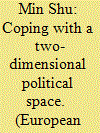

|
|
|
|
|
| Publication |
2009.
|
| Summary/Abstract |
European Union referendums invite national electorates to vote on transnational cooperation and regional integration, thereby creating tension between transnational ballot issues and domestic electoral mobilisation. Because of the tension, domestic political parties are forced to confront a two-dimensional political space in EU referendums. In the referendum-generated political space, unless integration issues are more salient than domestic concerns, intra-divided and inter-converged mainstream parties tend strategically to abstain from the campaigns. Yet, explicit inter-party collusion may allow the pro-integration mainstream to form a party cartel in EU referendums. Suggestive evidence is drawn from a case study of the two Irish referendums on the Nice Treaty. Based on a party-candidate survey, Irish parties are mapped onto a latent two-dimensional political space. The findings shed new light on the initial abstention of Irish mainstream parties in the first Nice campaign and their subsequent mobilisation in the second referendum.
|
|
|
|
|
|
|
|
|
|
|
|
|
|
|
|
| 3 |
ID:
086990
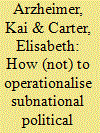

|
|
|
|
|
| Publication |
2009.
|
| Summary/Abstract |
Based on an aggregate analysis of the French regional elections of 2004, Kestilä and Söderlund, in their 2007 article, 'Subnational Political Opportunity Structures and the Success of the Radical Right: Evidence from the March 2004 Regional Elections in France', examine the impact of subnational political opportunity structures on the success of the radical right and argue that such an approach can control for a wider range of factors and provide more reliable results than cross-national analyses. The present article disputes this claim on theoretical, conceptual and methodological grounds and demonstrates that their empirical findings are spurious.
|
|
|
|
|
|
|
|
|
|
|
|
|
|
|
|
| 4 |
ID:
086989
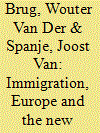

|
|
|
|
|
| Publication |
2009.
|
| Summary/Abstract |
Kriesi et al. announced the birth of a new cleavage in contemporary Western Europe, one dividing the winners and losers of globalisation. Their studies in 2006 and 2008 contain analyses of party positions in six countries, based on the contents of editorial sections of newspapers. This article challenges the main conclusion of Kriesi et al. by demonstrating ? on the basis of two expert surveys ? that party positions are mainly structured by one dimension. The structure detected by Kriesi et al. in their analysis of parties is not found, except concerning voter positions. A consequence of this article's findings is that large groups of citizens are not represented by any parties, in particular those who are left-wing on socio-economic issues and right-wing on cultural issues. The article in its conclusion discusses possible causes for the differences between these findings and those of Kriesi et al., and the implications of these findings for democratic representation.
|
|
|
|
|
|
|
|
|
|
|
|
|
|
|
|
| 5 |
ID:
086992
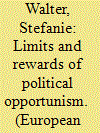

|
|
|
|
|
| Publication |
2009.
|
| Summary/Abstract |
Politicians are often assumed to be opportunistic. This article examines both whether there is a limit to this opportunism and whether voters reward policy makers for opportunistic behaviour. By looking at currency crisis situations, the article presents a graphic rational opportunistic political business cycle model in which incumbents face a tradeoff between their wish to signal competence and the economic constraints imposed by the crisis. It analyses how electoral incentives affect policy makers' management of currency crises and how this management in turn affects the subsequent election outcome. The empirical results of probit models with selection using a sample of 122 crises in 48 industrial and developing countries between 1983 and 2003 confirm the model's prediction that under certain circumstances some types of policy makers do indeed have incentives to deviate from optimal policy in the run-up to elections - and that voters reward this behaviour by re-electing policy makers who follow such strategies. However, there is a limit to the readiness to manipulate: when speculative pressure is too severe, incumbents no longer manipulate policy but implement the least painful policy option instead.
|
|
|
|
|
|
|
|
|
|
|
|
|
|
|
|
| 6 |
ID:
086991
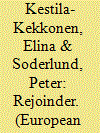

|
|
|
|
|
| Publication |
2009.
|
| Summary/Abstract |
We are delighted to see that Arzheimer and Carter (2009) have taken up the challenge to discuss possible flaws in our (Kestila and Soderlund 2007) application of political opportunity sturcture theory in the subnational context.They address several interesting questions in their critique of our paper, and they make some good points worth considering in future research.
|
|
|
|
|
|
|
|
|
|
|
|
|
|
|
|